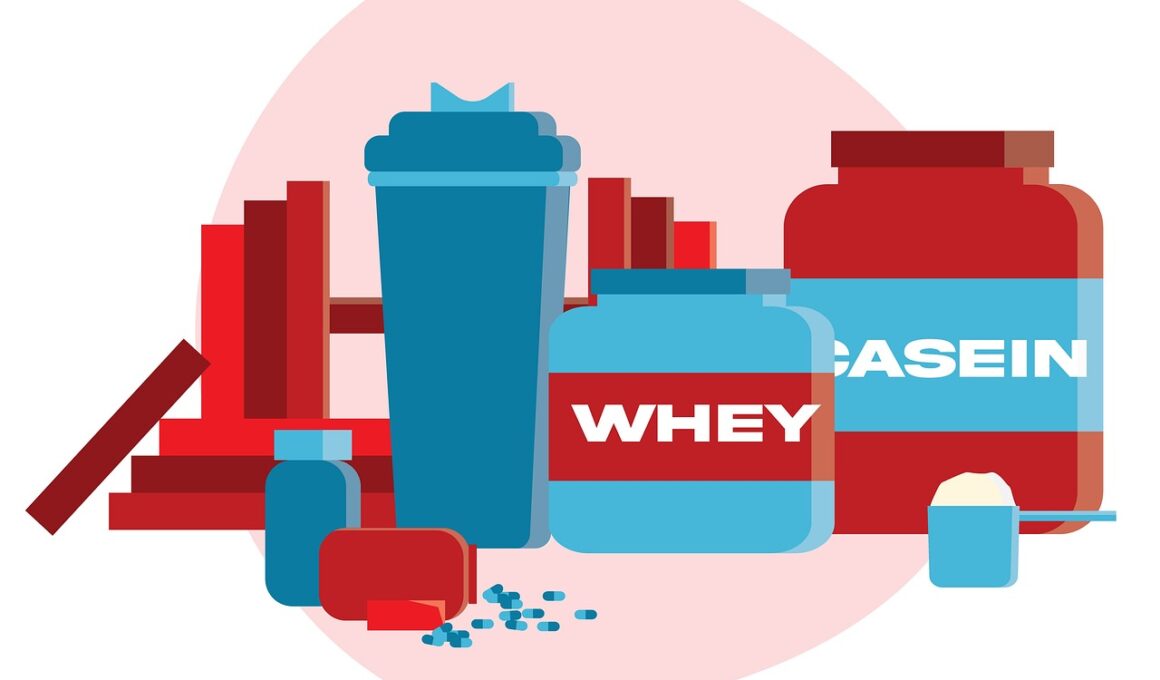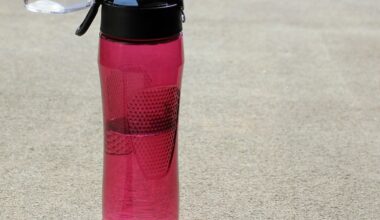Supplements and Their Role in Fitness Challenges
In the realm of fitness challenges, supplements play a pivotal role in enhancing performance and recovery. Many individuals embark on journeying through rigorous workouts, and the right supplements can significantly aid in achieving impressive results. These products vary widely, ranging from protein powders to vitamins and minerals, all designed to assist athletes and fitness enthusiasts in reaching their goals. Understanding the specific needs of your body is essential when considering which supplements to incorporate into your routine. One must first evaluate their fitness objectives, whether that’s boosting energy, muscle recovery, or overall health. Besides, proper nutrition coupled with supplements can help optimize performance and endurance. Remember, however, that supplements should complement a balanced diet rather than replace it. Engaging in specific fitness challenges also stresses the importance of hydration, which should be prioritized alongside supplementation. Choosing organic or high-quality products ensures that you’re supporting your body responsibly. With countless options available, conducting thorough research and possibly consulting a healthcare professional can lead to informed decisions that align with your fitness journey. This balanced approach will create lasting positive impacts on your challenge experience.
A variety of supplements exists to support distinct aspects of fitness challenges. One popular category is protein supplements, which aid in muscle recovery and growth. Protein powders, available in forms such as whey, casein, or plant-based options, offer a convenient way to meet daily protein requirements, especially for those engaged in intense training. Another essential supplement is creatine, known for enhancing strength and explosive energy during high-intensity workouts. It helps in replenishing ATP within muscle cells, leading to improved performance. Furthermore, branched-chain amino acids (BCAAs) can prevent muscle breakdown and reduce soreness after rigorous training sessions. For those tackling endurance challenges, electrolyte supplements can replenish lost nutrients and maintain hydration levels during prolonged activities. Additionally, various vitamins and minerals, such as Vitamin D or magnesium, support overall health and aid in recovery. However, it is crucial to understand the potential side effects and interactions with other medications before starting a new supplement regimen. Prioritize using credible resources for researching supplement efficacy, and consider consulting with a nutritionist to create a personalized plan that aligns seamlessly with your training objectives and lifestyle.
Importance of Timing in Supplementation
The timing of supplement intake can greatly influence workout results and recovery periods. Consuming specific supplements at strategic times improves absorption rates and maximizes effectiveness. For instance, taking protein supplements just after a workout stimulates muscle protein synthesis, allowing for greater growth after intense training. Research suggests a post-workout window of approximately 30 to 60 minutes is ideal for nutrient intake. On the other hand, some supplements may have a cumulative effect, emphasizing intake consistency rather than timing alone. Creatine, for example, works best when included in a regular routine, regardless of specific workout times. Pre-workout supplements are another powerful tool for athletes seeking increased energy and focus. Ingredients like caffeine or beta-alanine can enhance performance if taken 30 minutes before exercise. Also, specific vitamins may require food for better absorption, pointing to the importance of assessing individual nutrient needs. Proper timing also plays a crucial role during challenges; some individuals find advantages in spreading doses throughout the day. This can maintain energy levels and optimize recovery throughout their fitness journey, creating sustained performance benefits addressing energy and recovery needs during fitness challenges.
While utilizing supplements, it’s critical to remain mindful of the potential for misinformation regarding their effects. Not all products on the market deliver the promised benefits, leading to confusion among fitness enthusiasts. To avoid falling victim to misleading claims, one should always look for transparency in product labeling. This includes understanding the ingredients, precise dosages, and the science behind their applications. Researching user reviews and studies can provide valuable insight into the efficacy of a particular supplement. Certified third-party testing may also lend credibility to brands, ensuring that the contents match the labels accurately. Additionally, staying updated on regulations and advisories put forth by health organizations can protect against unsafe products. Individuals should also recognize that everyone’s body responds differently to supplements. Thus, experimenting with various options to find the right fit is essential. Collaborating with fitness professionals or dieticians can significantly enhance decision-making regarding supplementation. Optimizing the results of fitness challenges demands a personalized approach involving understanding individual responses, goals, and supplementation needs to effectively support performance and recovery.
Natural vs. Synthetic Supplements
When considering supplements, there’s a significant debate regarding natural versus synthetic options. Natural supplements are derived from whole foods and plant sources, often seen as healthier alternatives due to their nutrient density. Examples include herbal extracts, whole food vitamins, and omega-3 oils extracted from fish. These supplements typically contain fewer additives, promoting overall wellness through entire food chains. On the flip side, synthetic supplements are manufactured and can offer concentrated doses of specific nutrients. They may be more cost-effective but could lead to absorption issues due to their artificial nature. Furthermore, some individuals may prefer the taste or digestibility of natural products over synthetic ones. Assessing personal preferences alongside ethical considerations should guide decisions between these two categories of supplements. Furthermore, understanding how supplements interact with each other is vital for achieving the desired effects while ensuring safety. Therefore, research becomes crucial in identifying reputable brands specializing in quality natural products. Finally, aligning the choice of supplements with individual health needs and goals enhances their effectiveness and supports seamless integration into a fitness challenge regimen.
Moreover, establishing a clear strategy for incorporating supplements into your fitness challenges brings out the best results. Begin with a personal assessment to determine your objectives, challenges, and dietary restrictions. This allows for selecting appropriate supplements tailored to your requirements. Establishing a routine further helps ensure consistency in use, maximizing the benefits of supplementation. Additionally, monitoring your progress is essential; be aware of changes in energy levels, recovery rate, and overall performance. This feedback assists in evaluating the efficacy of the supplement strategy. Adjustment may be necessary based on findings, encouraging a responsive approach to individual needs. Furthermore, keeping a balanced diet rich in whole foods ensures a foundational level of nutrition that supplements can build upon, promoting overall health goals. Allow for flexibility in the regimen as different challenges may require changing focus or supplemental needs. Community engagement, such as joining fitness forums or groups, brings much-needed support and shared experiences regarding different supplementation strategies. Embracing the nuances of personalized supplementation not only enhances performance but also fosters a more holistic understanding of your fitness journey when facing challenges.
Final Thoughts on Supplements in Fitness Challenges
Ultimately, the journey through fitness challenges can be enriched greatly through informed supplementation. The breadth of available options allows individuals to choose products that best fit their specific needs. However, education plays a pivotal role in navigating this landscape effectively. Understanding the science behind each supplement, considering personal goals, and assessing physiological responses foster a knowledgeable approach to supplementation. Accountability in this journey is instrumental; partnering with dietitians or fitness coaches enhances the experience and outcomes. Also, embracing a well-rounded fitness plan that includes proper nutrition, exercise, and rest allows supplements to act as a supportive element rather than the primary focus. This interconnected strategy promotes sustainable progress even beyond specific challenges, leading to long-term health benefits. Recognize that while supplements can amplify efforts, they are not miraculous solutions; hard work and dedication remain paramount. The ultimate aim is maximizing each journey’s outcomes while maintaining overall wellness. By approaching supplementation holistically, fitness enthusiasts can cultivate essential relationships with their health and sustain motivation through every challenge they pursue.
In summary, supplements can be valuable tools in achieving success within fitness challenges. However, individuals should remember that the foundation of fitness lies in healthy habits, lifestyle choices, and commitment to optimal training practices. Supplements are most effective when paired with a structured approach that prioritizes a balanced diet, consistent exercise, and proper recovery strategies. By integrating thoughtful supplementation into your routine, the journey through fitness challenges can become enriched and enhanced.


